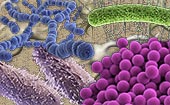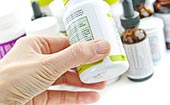Probiotics for Infection Support

More than 1000 different species of microorganisms make up your microbiome. Mounting evidence links chronic diseases like IBS, Crohn’s, asthma and obesity to disruption of your intestinal flora.
Did you know that your digestive system contains over 100 trillion bacteria, yeast and other probiotic microorganisms? That adds up to over 3 pounds of bacteria inside your gut. In fact, you are more bacteria than human as microorganisms outnumber human cells inside your body by 10 to 1.
Recent discoveries by the Human Microbiome Project have shed new light on what all these microorganisms are, what they do and how they affect your health. One of the key discoveries is that your microbiome (all the microorganisms living on and inside you) plays a bigger and more important role in disease prevention and recovery than previously thought.
Importantly, at least 60% of your immune system is located inside your intestines 1. If your microbiome is healthy and properly balanced, it is in constant communication with the tissues in your gut, allowing your body to fight invading infections 2. So balancing and maintaining your gut flora can play a key role in recovery from and prevention of MRSA and Staph infections.
The Probiotic Problem
As important as probiotics and your microbiome are, the modern world has done everything it can to destroy these protective bacteria. Society is waging an all-out war on germs with chemical disinfectants, sanitizers and antibacterial ingredients added to soap, toothpaste and hundreds of other consumer products. Antibiotic drugs which also kill of your friendly bacteria, are over-prescribed by most doctors. Public water is treated with chlorine chemicals to kill bacteria. And most people eat processed and sugary foods that were treated with pesticides and herbicides or genetically modified to survive spraying with these chemicals.
The problem is that all these chemicals, drugs and processed foods kill off much of your friendly and healthy bacteria leaving room for unhealthy species of bacteria to replace them. This disrupts your microbiome and weakens your immune system, leaving you more open to attack by infections and other diseases.
To compound the problem, most people don’t get enough probiotics to replenish what gets killed. Throughout history, people got all the probiotics they needed from the soil, from eating raw and fermented foods, from hunting and from living close to nature. But today most people avoid contact with dirt or the outdoors. It seems for many children with germophobic parents, making “mud-pies” is a thing of the past. Most modern foods are also pasteurized, processed and cooked, which kills any probiotics the food might have contained.
How to Restore your Microbiome

Probiotics are one of the easiest ways you can shift the balance of good and bad bacteria in your microbiome.
There are several ways to balance and restore your microbiome and to avoid damage to your healthy bacteria. The first step is stop assaulting your microbiome with chemicals and toxins that kill it. Eat more organic whole raw foods and reduce processed, genetically modified (GMO) and sugary foods. Also avoid as much as possible chemical disinfectants, antimicrobial ingredients and other chemicals and drugs that kill your beneficial flora.
The next step is to take a quality probiotic supplement to help replenish and stimulate your healthy intestinal flora. There are hundreds of different probiotic products on the market today. Unfortunately, 90% of these products lack the potency, survivability or the compatibility with your microbiome to function as a true probiotic to your body 3.
Probiotic products that contain soil based, spore-forming species are ideal. Spores are hard protective shells that help the probiotic bacteria survive your stomach acid and make it into your intestines where they are needed. Spore based probiotics also do not require refrigeration, making them stable during shipping. Products with a high potency are also ideal. Potency is usually expressed as colony forming units (CFU) or number of spores in each serving.
Because probiotics are live organisms that can stimulate your immune system, if you are severely immune-compromised, you should discuss probiotic use with your doctor before taking probiotic supplements.
If you’d like to know Michelle Moore’s favorite source of professional strength probiotics, please contact us here.
Feasting on fermented foods
Another way to help heal and maintain your microbiome is to eat more naturally fermented foods. Yogurt is the most popular food that’s supposed to contain beneficial bacteria. But the numbers of living bacteria in yogurt is usually very low. Most yogurt products also contain conventional dairy ingredients (which contain antibiotics) and lots of sugar, making yogurt an unhealthy option. Instead, raw and unprocessed fermented foods such as fermented vegetables, kefir and sauerkraut are a healthy and rich source of probiotics and vitamins.

References
1. J. International Archives of Allergy and Immunology 2002;95:2698
2. Host-Pathogen Interactions: the seduction of molecular cross talk, J. Gut 2002;50:32
3. Guidelines for the Evaluation of Probiotics in Food https://www.who.int/foodsafety/fs_management/en/probiotic_guidelines.pdf





